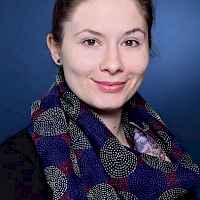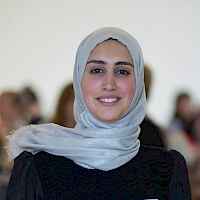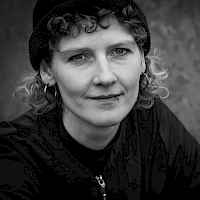Contested Girlhood: Between Control and Agency
- Johanna Elle (Chair)
- Melanie Schmitt
- Rayan Korri
- Beatrice Odierna
This panel discusses representations and socio-political approaches targeting young female refugees as a specific “vulnerable group”. Whereas many studies argue that refugee girls and women are confronted with specific challenges and forms of violence, the papers presented at the panel demonstrate the problems and pitfalls of such dominant perceptions. The paper presentations provide insights into the self-perception of young refugee women and their attempts to re-claim agency.
-

Beatrice Odierna
Ludwig Maximilian University Munich, Institut for Ethnology
Contesting Notions of Agency: Approaching the Figure of the ‘Young Female Refugee‘ in the Micropolitics of Everyday Social Interaction
Within public discourse on ‘refugees’ in Germany, there can be identified a tendency to draw on stereotypical ideas of gender to construct notions of difference. While the ‘male refugee’ is portrayed as being violent and dangerous, a possible threat to German society, the figure of the ‘female refugee’, especially the ‘young female refugee’, is more often either neglected or represented as the exemplary victim of sad circumstances which has to be ‘saved’ from harm.
While this manner of representing people designated as some kind of ‘refugee’ seems well established and researched with regard to media representation as well as political debate, the workings of gendered images within everyday processes of bordering (Yuval-Davis 2013) and differentiation still deserve a closer look.
Thus, in my presentation, I would like to follow the question how images of gender and alterity are negotiated and become effective in the micro-politics of everyday social interaction, especially in the field of social work with ‘refugees’. Drawing on examples from my ongoing PhD fieldwork, e.g. practices of funding and daily counseling, I would like to show how differing constructions of the ‘young female refugee’ with regard to her missing or assumed ‘agency’ play a key role within everyday processes of bordering.
Beatrice Odierna is a PhD student and research associate at the Institute of Social and Cultural Anthropology at Ludwig-Maximilians-Universität in Munich. After receiving a Master’s degree in Middle Eastern diaspora studies from the University of Edinburgh, she was working for about four years as youth worker and consultant in different refugee accommodations. Drawing on experiences in the fields of Social and Cultural Anthropology as well as Social work, her PhD research focusses on ‘Processes of Subjectivation and Self-Formation of ‘Young Female Refugees’ in Germany’. The PhD is part of a project funded by the DFG.
-

Rayan Korri
Ludwig Maximilian University Munich, Medical Research
Reproductive justice status of Syrian adolescent refugee girls and young women in an urban setting in Lebanon
War in Syria caused the forced displacement of millions of Syrians to neighbouring countries. Lebanon is considered the host country with the largest overall number of Syrian refugees per capita. Adolescent refugee girls and young women experience unique vulnerability during human emergencies and suffer from poor sexual and reproductive health (SRH) outcomes. Their SRH outcomes are frequently caused by the shortage of adequate SRH knowledge, the dearth of accessible youth-friendly facilities that could provide SRH services, and the neglection of their SRH experiences and needs because of the sensitivity of the issue and the prioritizing of other necessities like nutrition and sanitation. We conducted an explorative qualitative study to learn more about the SRH perceptions and experiences of Syrian Arab and Kurdish refugee adolescent girls living in Bourj Hammoud, an urban setting in Lebanon. The study is part of a doctoral project, which falls within the category of developmental studies in the fields of public health and medical anthropology. It aims to evaluate the SRH of adolescent refugee girls and young women living in an urban setting and to understand how it is being affected by cultural practices, value systems, social diversification, and institutional determinations.
Rayan Korri is pursuing her PhD studies in Medical Research at LMU since April 2018. She is a scholarship holder from Konrad-Adenauer-Stiftung. Along her studies and for the last 6 years, she is involved in the work of different NGOs in Lebanon and Germany that support refugee women. Additionally, she worked between 2016 and 2020 in various institutions on research projects that study the different perspectives of the asylum seekers and refugees journey to Europe and their lives in Germany. Max Planck Institute for the Study of Religious and Ethnic diversity, the Institute for Sociology at Georg-August-Universität, and the Faculty for Linguistics and Literature Studies at LMU are some of these institutions.
-

Melanie Schmitt
Catholic University of Eichstätt-Ingolstadt, Refugee and migration research
Between regulation and empowerment – Refugees in the context of sex education
Not only political parties, media and legislative processes are actors in the regulation of sexual politics, but also practitioners in sexual education contexts. Their educational mission can be discussed with regard to the (il-)legitimacy of sexual identities, bodies, and the enabling or denial of (individual) sexual lifestyles. This lecture presents empirical findings based on a study on sexual education programs offered by various welfare organizations that have been set up since 2015/16 specifically for refugees and sheds light on the sexualized and gendered patterns of interpretation used by sexual educators in relation to the target group. In the German context, the study breaks new ground, as it is the first to address the extracurricular sector of sexual education with reference to migration from a scientific perspective. Based on eight interviews with sexual education experts, the effectiveness of the hegemonic discourse on sexuality in relation to refugees is shown. A discourse which complicates thinking and acting outside the images which itself produces. The study makes use of feminist-postcolonial approaches, as these enable a differentiated view on the interconnections between migration, sexuality and gender. The findings of the analysis can thus be viewed in terms of regulative, structuring, and classifying mechanisms in relation to gender relations and othering processes that accompany them. For example, the educational mission formulated by the interviewees in relation to the target group reveals a gendered perspective that frames the sexual lifestyles of refugee men and women differently. The German context is constructed differently regarding refugee men and women. While in the context of refugee men the risk of sexual assault is focussed, Germany appears as a place that guarantees the opportunity of sexual self-determination when it comes to refugee women.
Melanie Schmitt has been a research assistant at the Chair of Refugee and Migration Studies at the Catholic University of Eichstätt-Ingolstadt since April 2020. She holds a master’s degree in International Migration & Intercultural Relations from the University of Osnabrück and her master’s thesis dealt with refugees as a target group of sexual education work.
Contributors
-

Chair
Johanna ElleUniversity of Göttingen, Institute for Cultural Anthropology/European Ethnology
-

Melanie Schmitt
Catholic University of Eichstätt-Ingolstadt, Refugee and migration research
-

Rayan Korri
Ludwig Maximilian University Munich, Medical Research
-

Beatrice Odierna
Ludwig Maximilian University Munich, Institut for Ethnology
Join
To take part in the conference please register here. After completing the registration, your login data and further information will be sent to you by email.